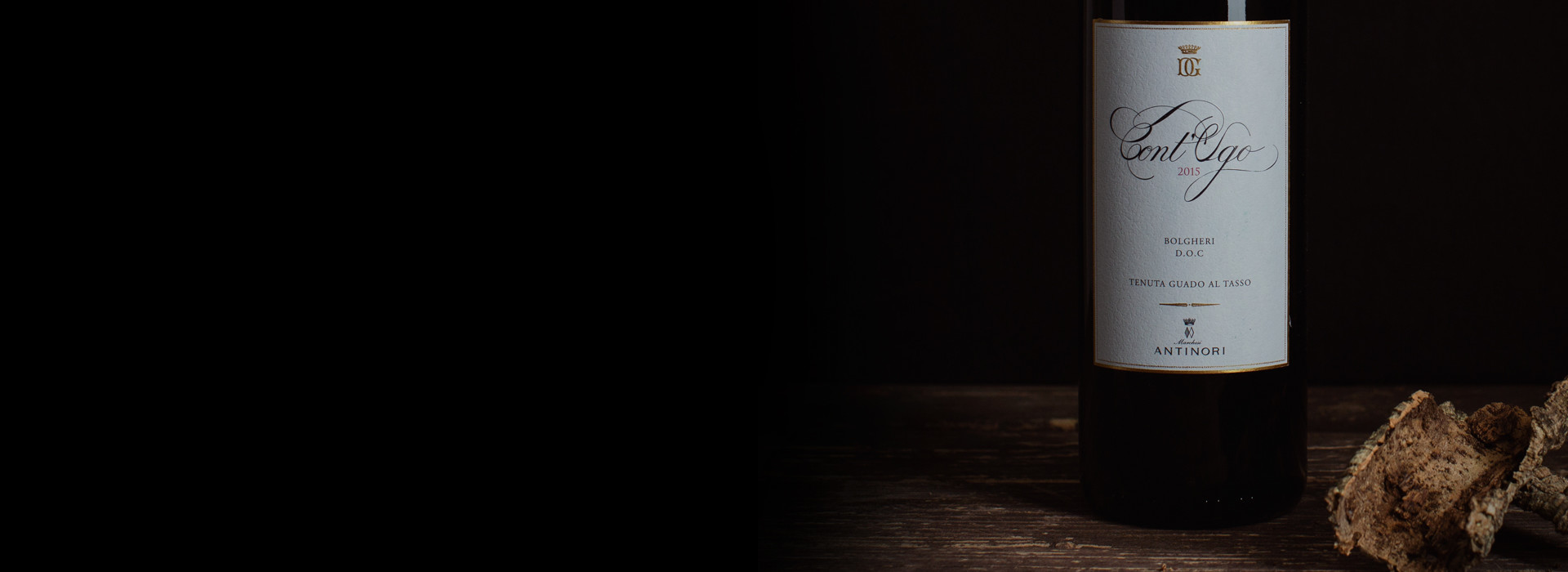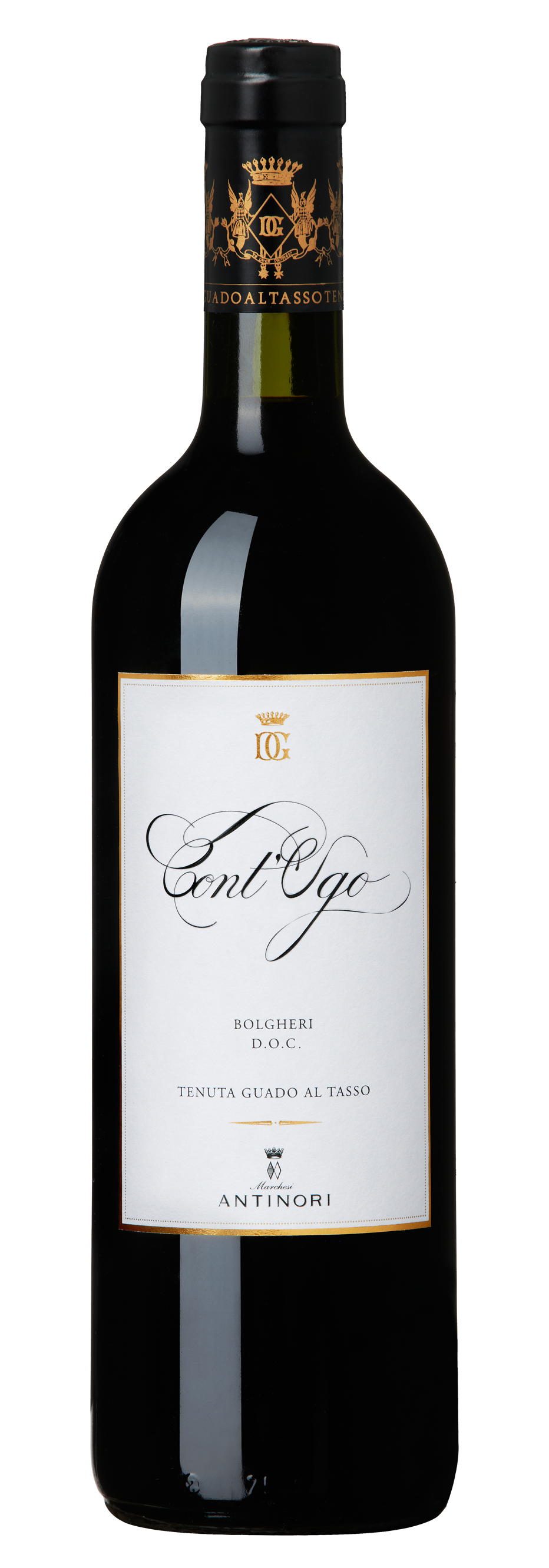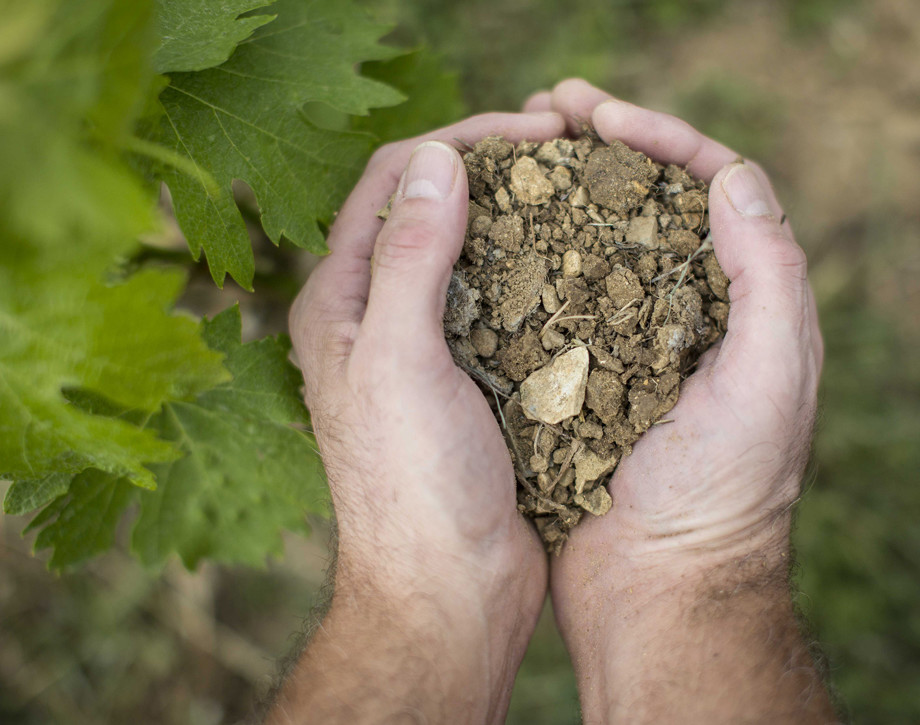Cont'Ugo

Climate
The 2013 vintage was, on the whole, a cool one, above all in springtime and during the fall. Winter was marked by rainfall which left useful reserves of ground water in the soil. After a cool spring, a warm and sunny summer led to a proper growth and development of the plants and grapes. At the end of August, it was necessary to proceed to a manual removal of vine leaves in some of the vineyard plots in order to expose the grape bunches to direct sunlight and obtain those characteristics of extract and complexity which characterize this wine.
Vinification
The selection of the grapes to be used for this wine was made from the over 100 acres (40 hectares) of Merlot in the vineyards of the estate. After a careful hand sorting and selection of the grapes in the cellar, the must went into stainless steel fermenting tanks where it fermented and remained in contact with its skins for an overall period of 20 days. The fermentation temperature was regulated on the basis of the ripeness level of the grapes: some fermented at lower temperatures to maintain greater aromatic freshness, others at a temperature of approximately 86° Fahrenheit (30° centigrade) to achieve greater structure and concentration. Different types of Merlot were accordingly produced, and each went separately into oak barrels . The malolactic fermentation took place in barrels (1/3 of which were new) and terminated by the end of the year. The finest lots, after an eight month period of aging in French oak barrels, were blended and given a final four months of barrel aging before bottling. The finished wine was aged for an additional six months in bottle before commercial release.
Historical Data
The Guado al Tasso estate is located in the small, but prestigious, Bolgheri appellation on the coast Tuscany’s Upper Maremma, some 60 miles (100 kilometers) to the southwest of the city of Florence. This appellation has a relatively short history (it was created in 1994) but can boast a worldwide fame as a reference point wine on the international scene. The estates covers an area of about 320 hectares (790 acres) planted to vines, in a splendid plain surrounded by hills known as “the Bolgheri amphitheater” for its particular geographical conformation. The Guado al Tasso vineyards consist principally of Cabernet Sauvignon, Merlot, Syrah, Cabernet Franc, Petit Verdot, and Vermentino grapes; this last cultivated with both with white and red varieties. They enjoy a mild climate due to the nearby presence of the Mediterranean Sea, constant breezes mitigate summer heat, and the rigors of winter clear the sky and maintain a high degree of solar light and radiation. Cont’Ugo is produced exclusively from Merlot grapes in order to interpret the territory of Bolgheri from a new perspective. The vineyards, situated at an altitude between 150 and 200 feet (45-60 meters) above sea level on clayey-loam soils prevalently of alluvial origin, gave Cont’Ugo great depth and complexity while conserving the fragrance and richness of fruit which are typical of Merlot.
Tasting Notes
The nose of the wine shows notes of plums and blueberries along with sweet spices and underbrush. On the palate, it is vibrant, long, and balanced. The harmony and the fullness of fruit on the finish and aftertaste are the characterizing traits of the wine.
Awards
Wine Spectator 93/100 USA Antonio Galloni 92+/100 USA Wine Advocate 88/100 USA

The Wine
Cont’Ugo is produced entirely with Merlot as a new interpretation of the Bolgheri territory. The vineyards grow at an altitude that varies between 45 and 60 meters (147/196 feet) above sea level on clay-loam soils that are of alluvial origin that give the wine deep complex notes while preserving the fragrance and freshness typical of Merlot berries.

Climate
The 2013 vintage was, on the whole, a cool one, above all in springtime and during the fall. Winter was marked by rainfall which left useful reserves of ground water in the soil. After a cool spring, a warm and sunny summer led to a proper growth and development of the plants and grapes. At the end of August, it was necessary to proceed to a manual removal of vine leaves in some of the vineyard plots in order to expose the grape bunches to direct sunlight and obtain those characteristics of extract and complexity which characterize this wine.
Vinification
The selection of the grapes to be used for this wine was made from the over 100 acres (40 hectares) of Merlot in the vineyards of the estate. After a careful hand sorting and selection of the grapes in the cellar, the must went into stainless steel fermenting tanks where it fermented and remained in contact with its skins for an overall period of 20 days. The fermentation temperature was regulated on the basis of the ripeness level of the grapes: some fermented at lower temperatures to maintain greater aromatic freshness, others at a temperature of approximately 86° Fahrenheit (30° centigrade) to achieve greater structure and concentration. Different types of Merlot were accordingly produced, and each went separately into oak barrels . The malolactic fermentation took place in barrels (1/3 of which were new) and terminated by the end of the year. The finest lots, after an eight month period of aging in French oak barrels, were blended and given a final four months of barrel aging before bottling. The finished wine was aged for an additional six months in bottle before commercial release.
Historical Data
The Guado al Tasso estate is located in the small, but prestigious, Bolgheri appellation on the coast Tuscany’s Upper Maremma, some 60 miles (100 kilometers) to the southwest of the city of Florence. This appellation has a relatively short history (it was created in 1994) but can boast a worldwide fame as a reference point wine on the international scene. The estates covers an area of about 320 hectares (790 acres) planted to vines, in a splendid plain surrounded by hills known as “the Bolgheri amphitheater” for its particular geographical conformation. The Guado al Tasso vineyards consist principally of Cabernet Sauvignon, Merlot, Syrah, Cabernet Franc, Petit Verdot, and Vermentino grapes; this last cultivated with both with white and red varieties. They enjoy a mild climate due to the nearby presence of the Mediterranean Sea, constant breezes mitigate summer heat, and the rigors of winter clear the sky and maintain a high degree of solar light and radiation. Cont’Ugo is produced exclusively from Merlot grapes in order to interpret the territory of Bolgheri from a new perspective. The vineyards, situated at an altitude between 150 and 200 feet (45-60 meters) above sea level on clayey-loam soils prevalently of alluvial origin, gave Cont’Ugo great depth and complexity while conserving the fragrance and richness of fruit which are typical of Merlot.
Tasting Notes
The nose of the wine shows notes of plums and blueberries along with sweet spices and underbrush. On the palate, it is vibrant, long, and balanced. The harmony and the fullness of fruit on the finish and aftertaste are the characterizing traits of the wine.
Awards
Wine Spectator 93/100 USA Antonio Galloni 92+/100 USA Wine Advocate 88/100 USA

Tenuta Guado Al Tasso
The Guado al Tasso estate is located in the small but prestigious Bolgheri DOC, on the coast of upper Maremma, about one hundred kilometers southwest from Florence. This appellation has a relatively recent history, DOC Bolgheri was approved in 1995 and since then it has become an internationally recognized reference point for the Italian and international winemaking arena. The estate covers an area of 320 hectares (790 acres) planted with vines, set in a beautiful plain encircled by rolling hillsides known as the "Bolgheri Amphitheatre" due to its particular shape. The vineyards are planted to Cabernet Sauvignon, Merlot, Syrah, Cabernet Franc, Petit Verdot and Vermentino. The nearby sea provides a mild climate with constant breezes that mitigate summer heat and alleviate harsh winter weather, maintaining a clear sky and a high level of sunlight exposure.

Soil
Alluvial in origin, soils vary from sandy-clay to silty-clay and in some areas the presence of very fine gravel called scheletro (also known as agglomerate from Bolgheri).


















